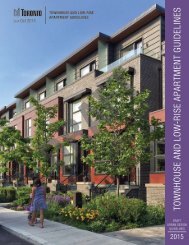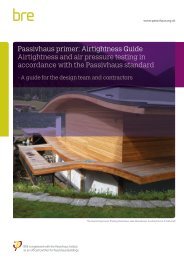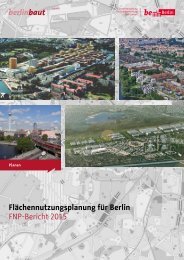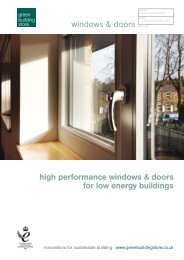TRUE URBAN SPIRIT
b008379b
b008379b
Create successful ePaper yourself
Turn your PDF publications into a flip-book with our unique Google optimized e-Paper software.
In-SU<br />
built. It is calculated by dividing the sum<br />
total of all areas of a building on a given<br />
plot of land by the size of the plot. The<br />
net floorspace ratio (NFSR) is applied if<br />
only the area of the actual building land is<br />
used as divider without taking account<br />
of public roads or open areas that are<br />
also part of the plot. An NGFZ of 2.0 thus<br />
would indicate that the total floor area of<br />
a building is two times the area of the<br />
plot on which it is constructed.<br />
Non-formal learning<br />
Non-formal learning is learning embedded<br />
in planned activities but not explicitly<br />
referred to as such (with regard to learning<br />
goals, learning support or the time<br />
spent with learning) yet including a distinct<br />
“learning element”. From the viewpoint<br />
of the learner, non-formal learning<br />
is intentional, and its results can be validated<br />
and certified. Non-formal learning<br />
is also referred to as “semi-structured<br />
learning”.<br />
Parking slot regulation<br />
The parking slot regulation is an instrument<br />
embedded in the Building Code for<br />
Vienna. In the context of land use and<br />
development plan drafting, it is thus possible<br />
to reduce the number of legally<br />
mandatory parking slots if an area is easily<br />
reachable by public transport. This<br />
reduced number of mandatory parking<br />
slots supports the traffic policy goal of<br />
strengthening eco-friendly means of<br />
transport (public transport, cycling and<br />
walking).<br />
PGO – Planungsgemeinschaft Ost<br />
This is a joint organisation of the Federal<br />
Provinces of Vienna, Lower Austria and<br />
Burgenland to consult and agree on<br />
relevant spatial planning issues. Its scope<br />
of work comprises the development of<br />
joint spatial planning objectives, the<br />
thematic co-ordination and scheduling of<br />
plans impacting regional space, the representation<br />
of joint interests and the<br />
implemen tation of research projects of<br />
importance for regional planning in<br />
the three federal provinces. In addition<br />
to a political deci sion-making body and<br />
the co-ordination body of the three provincial<br />
administrations, PGO also operates<br />
a joint office to implement its work programme.<br />
Praxisbuch Partizipation<br />
This practical manual published in 2012<br />
by Municipal Department 18 supports<br />
staff members of the Vienna City Administration<br />
working in the field of urban<br />
development or related areas such as<br />
public space design in their professional<br />
design, planning and implementation of<br />
public participation processes (“Werk-<br />
statt berichte der Stadtentwicklung Wien”<br />
(No. 127)).<br />
Rainwater management<br />
Rainwater management offers the possibility<br />
of retaining water precipitated<br />
on built-up and sealed areas within the<br />
natural water cycle and thus relieving<br />
sewers. This can have a positive effect on<br />
temperature, air quality and climate.<br />
REGIONALE<br />
REGIONALE was introduced in North<br />
Rhine-Westphalia as a structural support<br />
measure. The Land of North Rhine-<br />
Westphalia thus offers regions ways and<br />
means to strengthen their regional profile.<br />
The aim lies in finding a common position<br />
in the context of international and<br />
national competition and thus to render<br />
the region competitive as an attractive<br />
place to live and do business in. Based on<br />
this model, a similar REGIONALE initiative<br />
could promote and strengthen competitions<br />
for joint projects in the Vienna city<br />
region.<br />
Resilience<br />
This word describes the ability of a system<br />
to deal with change. Resilience strategies<br />
may be inter alia preventive (resistance<br />
developed providently to withstand negative<br />
external influences), adaptive (ability<br />
to return quickly to the original situation)<br />
or innovative (active use of advantages<br />
resulting from changing environmental<br />
conditions).<br />
Services of general interest<br />
The term “services of general interest”<br />
stands for the comprehensive and reliable<br />
provision of public goods and services<br />
entailing a special responsibility for the<br />
community at large. This e. g. includes the<br />
provision of energy, (drinking) water, solid<br />
waste and wastewater disposal, education,<br />
culture, medical services and public<br />
transport. Services of general interest are<br />
characterised by the fact that all citizens<br />
have equal access to vital institutions and<br />
services as well as by the reliability and<br />
continuity of these institutions and services<br />
and, in case of public ownership of<br />
the bodies supplying them, by democratic<br />
control and public responsibility for them.<br />
In Austria, the definition and type of service<br />
performance are normally associated<br />
with a high degree of municipal autonomy.<br />
Smart grid<br />
Smart power grids are networks that<br />
link and control various components –<br />
electricity generator, storage unit, energy<br />
distribution and transmission networks –<br />
as well as consumers on the basis of<br />
sophisticated, fine-tuned management.<br />
In addition to the optimisation and monitoring<br />
of the individual components, the<br />
objective lies in ensuring efficient and<br />
reliable energy supply in the future.<br />
Stadtregion+<br />
The term “Stadtregion +” defines eastern<br />
Lower Austria, northern Burgenland<br />
and Vienna and in addition to the “core<br />
city” Vienna comprises 205 Lower Austrian<br />
and 63 Burgenland municipalities.<br />
Inter alia, commuter flows, accessibility<br />
conditions and demographic forecasts<br />
were used to delimit the space covered by<br />
this extended agglomeration. Under the<br />
title “Stadtregion+”, PGO analysed various<br />
possible scenarios of future settlement<br />
development and formulated a spatial<br />
development strategy.<br />
SUM – City-Environs Management<br />
SUM (Stadt-Umland-Management,<br />
City-Environs Management) is an initiative<br />
of the Federal Provinces of Vienna and<br />
139








